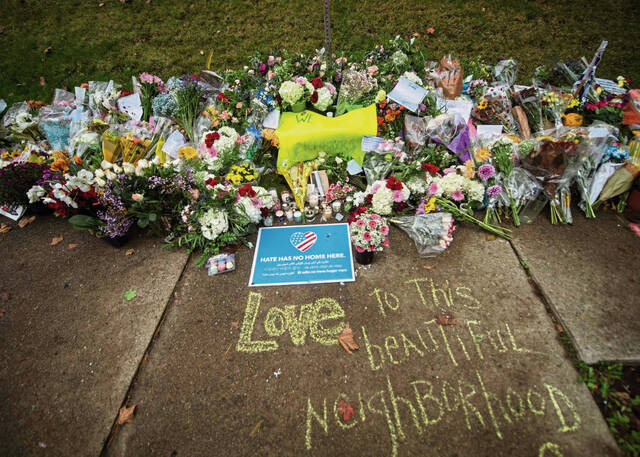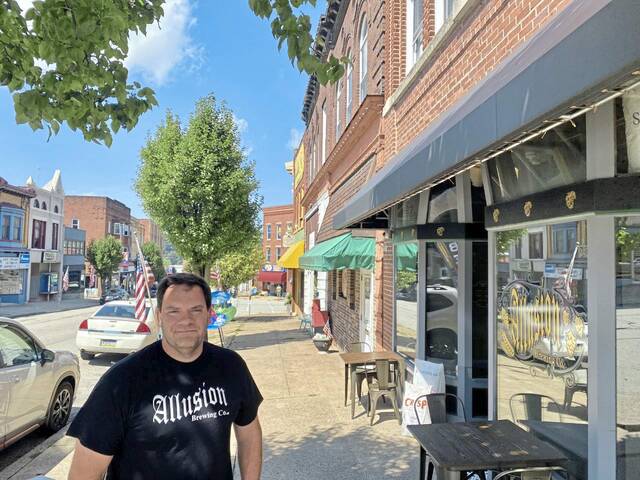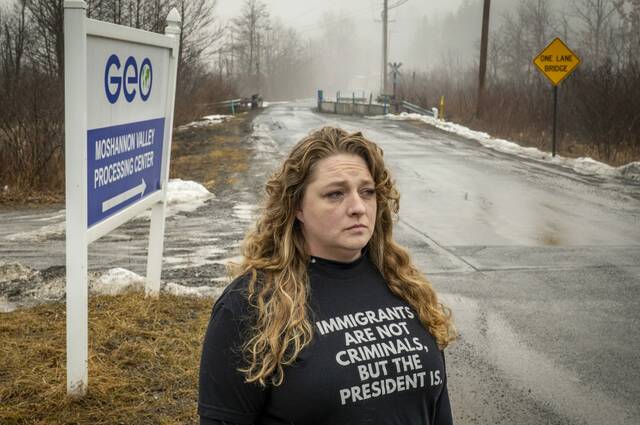Attorneys for the government and defense in the criminal case involving the mass shooting at Tree of Life synagogue filed a joint motion this week to submit their proposed jury questionnaire under seal.
The motion was docketed at 11:13 a.m. Monday. The judge granted the request less than six hours later.
The only explanation provided for sealing was: “(G)iven the subject matter of the documents and their potential to adversely affect the jury selection process before it has begun, the parties jointly request leave to file the documents under seal,” they wrote.
It was just the most recent request for sealing documents in the case that is now more than 3½ years old.
According to the federal court docket in the case, there have been 738 filings. Of those, 106 of them have been sealed. That includes 86 documents and motions and 20 orders from the court.
The majority of sealed filings have come from defense attorneys for Robert Bowers, the man accused of killing 11 people at the Squirrel Hill synagogue on the morning of Oct. 27, 2018.
A review of the docket shows the parties have sought to seal a wide range of documents. They include everything from personal information to requests for the appointment of additional court-appointed defense counsel to a motion requesting an extension of the deadline for filing challenges to the trial venue.
In the motion about venue, the defense wrote, “Mr. Bowers intends to file a motion seeking an extension of that deadline, and for the reasons set forth in the motion, he asks to file the extension motion under seal.”
But they never explain why it needs to be sealed. In a one-page order filed a day later, the request was granted.
Generally, said Ken White, a former federal prosecutor and criminal defense attorney in Los Angeles, court documents are supposed to be publicly filed.
If the parties seek to have them sealed, the court is expected to balance the First Amendment implications with the specific need, or “overriding interest,” for protecting privacy.
“Some judges apply that more vigorously than others,” White said.
Even in high-profile cases, he said, there is supposed to be a specific, identifiable reason to require sealing.
The request to seal the suggested jury questionnaire was an “extremely thin and boilerplate request to seal a document normally available to the public,” White said. “I think many federal judges would reject a request to seal on such a thin basis unless it had already been discussed thoroughly.”
Bruce Antkowiak, a former federal prosecutor and law professor at Saint Vincent College, said it’s unlikely a judge is going to make an independent inquiry on a request to seal if neither party is objecting.
“For the present time, the need to conduct a fair trial will supersede the public interest,” he said.
But, Antkowiak said, the public ought to have the ability to scrutinize how a case of this magnitude is being carried out: Is due process being followed? Is defense counsel functioning properly? Is the judge following the law?
“All of these things have a heightened public interest — not just from a voyeuristic perspective but because of the gravity of the situation,” he said.
Protecting the jury pool
Antkowiak said that because of the high-profile nature of the Tree of Life case, every filing is being reviewed and possibly reported on by the media. That, he suspects, is the reason the motion for the proposed jury questionnaire was sealed.
“They don’t want the jury pool to be polluted by additional reporting,” he said. “They’re hoping the passage of time and keeping down reports on the case will lessen the chances of people having made up their minds.”
That, Antkowiak said, is because courts hate having to pick juries from outside their jurisdiction. Bowers filed a motion seeking a change of venue, but U.S. District Judge Robert Colville denied it in March, saying he believed a panel of 12 impartial people could be seated from the 2.1 million people in the Western District of Pennsylvania.
In several high-profile prosecutions over the years in Allegheny County Common Pleas Court, the judge assigned to the matter would periodically visit the jury room while cases were in the pretrial phase. The judge would poll the prospective jurors to see what they knew about the case to determine whether an impartial panel could be selected.
That happened in the Richard Baumhammers shooting spree case, the prosecution of Richard Poplawski for killing three Pittsburgh police officers and in the trial of former East Pittsburgh police Officer Michael Rosfeld.
White suspects that the parties in the Bowers case plan to include in the prospective jury questionnaire questions about potentially inflammatory issues such as religion and extreme politics. The attorneys likely think that if those issues are discussed in the media first, it could taint the jury, he said.
“In other words, they want to be able to ask jurors questions about antisemitism without there having been media coverage of them thinking that attitudes about antisemitism are an issue,” White said.
Antkowiak agreed that those issues will be prominent in jury selection.
“This could have been any church. There’s an interest about the nature of the charge that will strike at the jurors’ hearts and cause angst,” he said.
This being a death penalty case, Antkowiak said, changes the nature of jury selection significantly.
Caroline Roberto, a longtime criminal defense attorney in Pittsburgh, said the parties want to protect the jury pool.
“If somebody gets it ahead of time, prospective jurors might be able to come up with reasons so they can be excused,” she said. “They’re always worried about people making things up to get out of it.”
Roberto said that under most circumstances, she wanted to limit media coverage of her clients’ cases.
“If you have a judge willing to put anything under seal, you’ve got to go for it,” she said.
Most of the time, though, a judge will not rubber-stamp sealing requests. Instead, judges will require a thorough explanation for the reason to seal — which can happen during status conferences or in private discussions in chambers.
It is the judge’s job, Roberto said, to balance the defendant’s right to a fair trial with the public’s right to open courts.
“As a criminal defense attorney, I’m not thinking about protecting the media’s right to the First Amendment,” she said. “I’m thinking about protecting my client’s rights.”
Antkowiak said that the prosecution is thinking about ensuring the trial is done right the first time.
“A good prosecutor wants to make sure there are no mistakes made,” he said. “If you can protect this record in any way, you protect it.”








